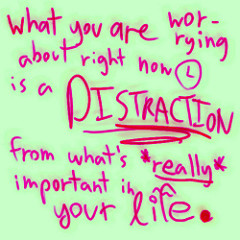
TEH TUBES OF THE INTERNETS ARE MAKING TEH CHILRENS STUPIDZ!
It’s a pretty common refrain. It’s even hit the webcomics scene with this Joy of Tech cartoon. The internet (and now, social networking) supposedly makes people unable to focus. And there’s some anecdotal (and rigorous) evidence that distractability has increased. I know someone who heard a fellow college student complain about a five page article being “too long”.
But I think we’re measuring the wrong thing here. Let me tie a few things together.
1. We know that humans do not parse and remember every detail – at least, not on a regular basis. If we did try to do that, we’d simply end up transfixed on simple details.
2. Humans parse out what’s relevant and only remember a small amount of what we actually parse. That’s one of the reasons why time seems to “slow down” for so many people in near-death situations – more details are parsed and remembered.
3. During the course of the 20th century, humans in the global West trained themselves to be better with abstract concepts. For example, “markets” used to just imply physical places to buy and sell goods, but now represent some intangible, abstract sensibility of buying and selling. This shifting to the abstract happened enough so that IQ tests (which have abstract reasoning as a large component of the test) had “normal” adjusted higher and higher over the last century.
Points one and two mean that people have a certain amount of “bandwidth” that they can parse. You could call it “a comfort zone of rate of stimuli”, but we’ll stick with bandwidth. Too much data for someone’s personal bandwidth, and they feel overwhelmed. Too little, and they feel bored. This isn’t anything new or radical.
Here’s what’s different: The problem isn’t bandwidth, but switching between layers of abstraction.
We – yes, I include myself here to some degree – are able to abstract things out and parse salient details a lot more quickly. We may not get all of a scene in a first-person shooter, but we’re definitely able to see what doesn’t fit (and shoot it). Because there’s a layer (or multiple layers) of abstraction, it’s easy to deal with a lot more data. (Simple example: Acronyms.)
This is good. It’s a useful skill, and lets us see processes that would be otherwise obscured. We can do really neat stuff when we can abstract away from the details.
This is bad. Abstraction is lossy. Details, subtlety, and the natural fractal complexity of life go by the wayside. (Think the way American politics has been headed, and how stupidly the issues are treated by all sides, and you get the idea.) Appreciation of a single rose is a completely lost art. We lose fractal complexity when we abstracting.
I’ve already hinted at part of the solution. Reality is fractally complex. You zoom far in, far out – it’s complex and higher-bandwidth than anyone needs. When we get stuck at a particular level of abstraction, we’re artificially (and somewhat permanently) throttling our bandwidth.
The solution is this: When it is time to amass huge amounts of data and shove it together in new and different ways (like the above), then be abstract. When it is time to really look at the back of your hand, then be detailed. Switch back and forth as needed rather than feeling overwhelmed or terminally bored and needing a new distraction.
